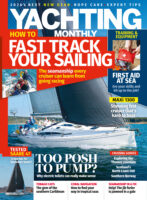Staring at the forecast or the barometer won’t change the weather. Best roll up our sleeves and get on with it, reckons Tom Cunliffe
It’s not long since I was part of a crowd of anxious skippers elbowing up to the latest harbourmaster’s forecast, cursing our luck at more strong headwinds with time running out. My hat blew off while I sympathised with a Gosport-based sailor stuck with the rest of us down west with five days of easterlies in prospect. His kids were due back in school and the vision of receiving today’s equivalent of six of the best from the headmaster if they failed to show up was not appealing.
As Louis MacNeice observed in the 1930s, ‘The glass is falling hour by hour, the glass will fall forever, but if you break the bloody glass, you won’t hold up the weather.’
He might have said that if the wind’s unfavourable, the wise accept that there’s nothing they can do about it.
A less literary way of looking at this suggests that when the synopsis isn’t what the doctor ordered, the pessimist complains, the optimist sits tight and hopes things will miraculously improve, but the realist spits on his hands, reefs down and gets on with the job.
If we’re honest, we’re all guilty of indulging in the first two. It’s the moral fibre implicit in the third that makes the difference between a successful outcome and going home by train, leaving the boat to soak up cash pending a rescue party after the wind sorts out its act.
The benefits of being a realist are obvious. The drawback is the inescapable fact that pragmatists don’t always have a nice time, and any efforts to stiffen the upper lip take a hammering as we remember we’re supposed to be enjoying this. The assumption is that bashing our way uphill will be less satisfactory than skulking in harbour. Except for the serial quitter, then, the issue would appear to be how to dredge the depths of our personalities to dig up the required backbone.
Anyone who has crossed the Atlantic north of 40° latitude has either sworn never to go to sea again or has come up with an answer. Given that the yacht is not fast enough to swing along a weather-routed highway of happiness, he’ll have had to compromise with fair and foul on a daily basis. Unless he lets the foul drive him nuts, he’ll have discovered some level of satisfaction even in the foulest.
Watching the sun burst through the crest of a thirty-foot wave as the cold front brings sunshine and the promise of an end to the madness lifts the soul. Noting how the ever-present fulmars sweep in and out of the valleys of the storm is a never-ending poem. Cracking off ten degrees from a dead muzzler while shortening down enough to stop the pounding furnishes the seaman with a sense of satisfaction. Every day on a long passage is a part of life, not a sprint to be endured. You can’t get off if you don’t like it. The only way ahead is to seek out the positive.
Most of us on coastal cruises are, of course, perfectly able to get off simply by staying in harbour and having another beer in the Bar du Port, but this may not always be the best option. The bottom line as we put out for our summer trips is that being a skipper, whether of a boat we’ve owned for forty years or as temporary master of a charter yacht, is like the accepting first two vows in the marriage service. ‘For better for worse, for richer for poorer.’ We accept that we’re going to be poorer. That goes without saying, but ‘better or worse’ is usually beyond our control.
We know well enough that unless the season turns out to be a benevolent one there will
be some ‘better’ and plenty of ‘worse’, but we press on because the ‘better’ is as agreeable an experience as life can offer. One thing’s sure, any day on a boat is a good day, and when the ‘worse’ is over, it’s the rough traverse that generates the yarns we all laugh at as winter finally sends us ashore.
Tom Cunliffe




